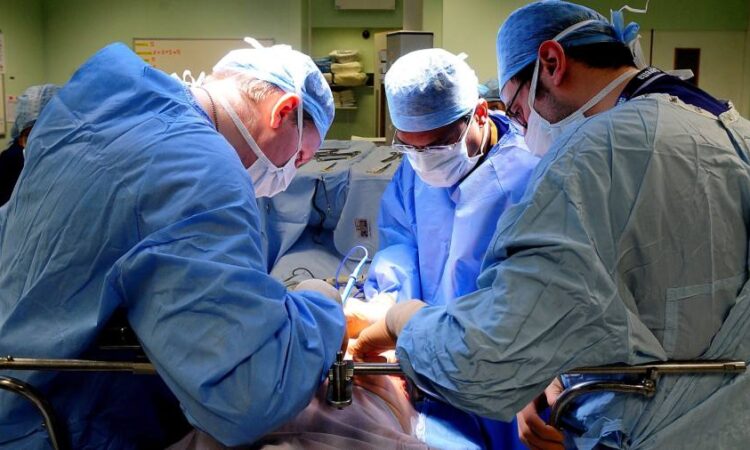
The UK has spent around 20 per cent less per person on health each year than similar European countries over the past decade, according to new research that shows how the NHS has been consistently starved of funding.
The data from the Health Foundation, which was shared with the Financial Times, found that health spending in the UK would have needed to rise by an average of £40bn per year in the past decade to match per capita health spending across 14 EU countries.
It comes as the government prepares to reveal its spending plans in Thursday’s Autumn Statement and casts fresh light on how a decade of austerity has affected the NHS, which is foundering as it braces for its hardest ever winter.

Last month the NHS’s finance chief warned the service was facing a £7bn black hole next year, in part due to the impact of inflation, which is eating into hard-won funding settlements.
Steve Barclay, health and social care secretary, hinted in a speech to the NHS Providers annual conference on Wednesday that the health service would receive more money in the Statement to help it cope with rising prices. “I can absolutely confirm we do need support to meet those inflationary pressures.”
In a report published on Thursday, the National Audit Office, the independent UK spending watchdog, said the NHS was struggling to meet its own targets for treating more patients as it grappled with inflation and deep workforce shortages.
Warning that plans to reduce long waits for NHS elective and cancer care services by 2025 were at risk, it said that health service officials “have expressed concern about reduced overall productivity, meaning the same staff and infrastructure are currently completing less work than before the Covid-19 pandemic”.
The lag between the UK and similar countries in expenditure levels revealed in the Health Foundation data, is matched by a gulf in survival rates for some conditions. In the UK, just 13 per cent of those diagnosed with lung cancer live for at least five years, according to 2014 data, the most recent available. This is the lowest among the countries studied, with Japan at the top on 33 per cent.
Meanwhile, 9 per cent of people in the UK who had the most common type of stroke died within 30 days in 2019, compared with 6.2 per cent in Germany.
“Either we are going to have lower quality healthcare relative to other countries or we spend more,” said Anita Charlesworth, director of research for the Foundation, who led the work.

In the decade before the pandemic the UK spent on average around a fifth less on day-to-day health costs than the major EU countries studied. During the Covid crisis, spending increased by 14 per cent compared to the EU14 average of just below 6 per cent. However this high level of spending had been needed to compensate for years of attrition in the run-up to the crisis, Charlesworth said.
The UK’s total healthcare budget was £187bn per year, on average, between 2010 and 2019. It would have needed to have spent £227bn to match the average across the EU14 over the pre-pandemic decade.
The increased funding meant that other countries were able to benefit from years of greater investment when the pandemic struck. In Germany, for example, a larger number of beds and higher staffing ratios than in the NHS helped to ensure the crisis did not disrupt other healthcare.

Professor Heyo Kroemer, chief executive of the Charité hospital in Berlin, one of Europe’s biggest academic medical centres, said that although some elective work was postponed and other activity reduced, there was no wholesale halt to non-Covid treatment and large waiting lists had not built up in the way they had in the UK.
He added that even though significant numbers of staff were currently ill with Covid the wait for a hip replacement, for example, was no more than a couple of weeks: “That is still in a time which you can stand,” he pointed out. In contrast, the median waiting time for patients waiting to start such elective treatment in England at the end of September was 14 weeks.
The Health Foundation research shows that the UK would have had to spend an additional £73bn, or 39 per cent more, in every year between 2010 and 2019 to match Germany.
Just four of the countries studied — Spain, Portugal, Italy and Greece — spent less per person than the UK over the same period. However, Charlesworth pointed out that this shortfall mainly resulted from a lack of spending on social care, reflecting a southern European tradition of families caring for loved ones.

The researchers also looked at Britain’s capital health spending on buildings, technology and equipment compared to its European neighbours. Although the available data only allowed comparisons to be made for eight countries, it found that between 2010 and 2019, an additional £33bn in cumulative UK investment in capital health infrastructure would have been needed to match the total EU average invested over the period. This would have required investment to be 55 per cent higher than it actually was.
The picture is not entirely bleak. Extolling the NHS’s screening services and the low sums it spent on administration, Charlesworth said: “There are real structural strengths to our system which enable us to use the precious resources more efficiently than many other countries and try to extract good health outcomes for that spend.”
However, she added that there was “only so far efficiency can take you”.
The Department for Health and Social Care said the NHS budget had been increased from £123.7bn in 2019-20 to more than £162bn in 2024-25.
It added that it planned to spend more than £8bn over three years to support elective recovery, and £5.9bn on NHS capital “to provide new beds, equipment and technology”.






